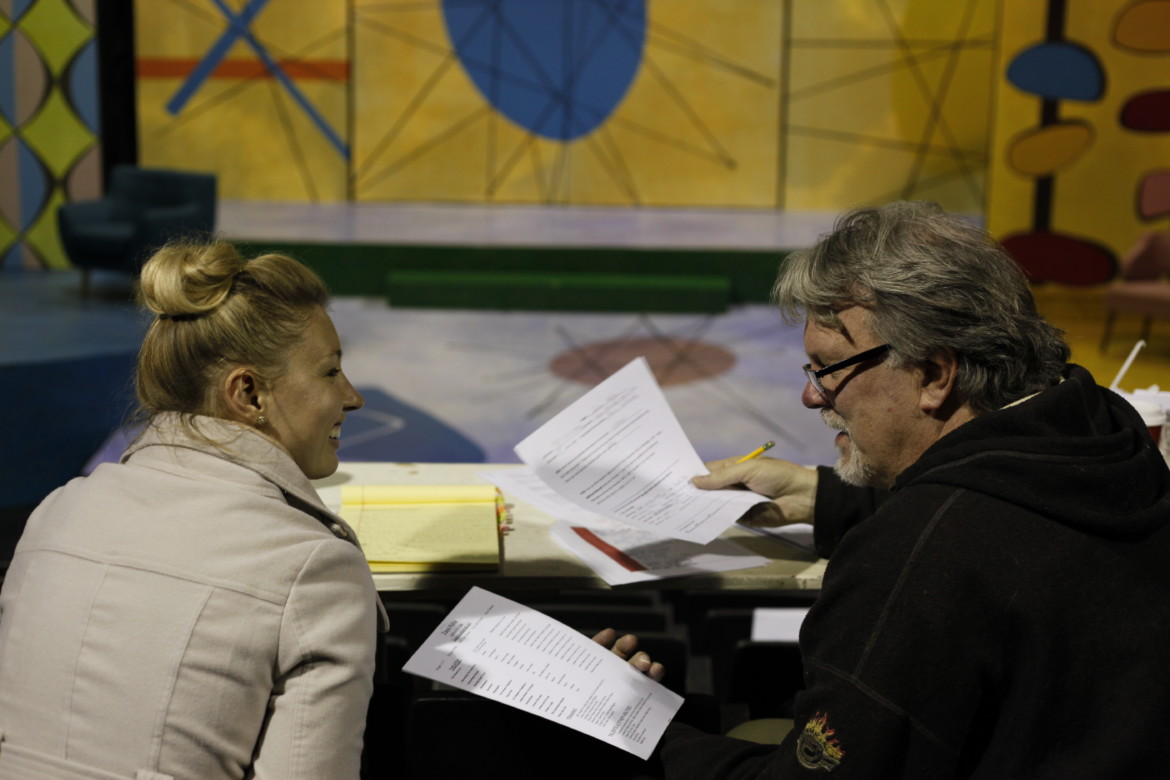Academy School of Acting students turn out for “In the Heights” tryouts
By Erasmo Guerra
Auditions for “In the Heights,” the School of Acting’s (ACT) upcoming spring production of the musical by Lin-Manuel Miranda, took place on Dec. 9 at the Sutter Theater. More than 30 performers gave it their all over the span of five hours. At the end of the long night, director and ACT instructor Clark Houston Lewis said that these auditions, like all of the other auditions they’ve held for other productions, were part of ACT’s training and education program. It’s why he encourages all of his students to sign up. “It’s a skill,” he said. “Build that muscle now.”
The audition hopefuls sang tracks with titles such as “It Won’t Be Long Now,” “Enough” and “Breathe,” songs from the Tony Award-winning musical, for which they were determined to land a part.
And while many of the performances would’ve caused a golden buzzer to go off in “America’s Got Talent,” or a chair to turn in “The Voice,” a few had trouble starting, asking for a do-over after a false start or a flub. And for others, there were technical issues with portable speakers they’d brought along or their cellphones, where a musical track was stored, not quite working out.
The auditions continued and many struggled with the second portion, a sight read of a few bars of music, but Lewis encouraged them to get through it. “It’s not supposed to be easy,” he offered from where he sat amid the theater seats under the glare of the house lights.
As for what makes for a successful audition, Lewis insisted an actor needed two things: skill and confidence. “You see people who have all the pieces, but they don’t know how to put it together. Or, they don’t know how to step into their confidence—which has to happen before they walk into a room,” he said. “You have to be the character—or learn how to fake it.”
Lewis further explained that auditions are like job interviews. “Put your best foot forward,” he advised. “It’s not just about what you can do in the moment, it’s also about your willingness to move forward. So when you say, ‘I can’t do this or that,’ it gives the director pause. And it keeps a director from casting you over someone who maybe wasn’t as good but had more of a self-starter impulse.” Lewis added, “There’s a way to be truthful without being negative.”
The best way to recover from a mishap is, according to Lewis, “First, be brilliant at the other stuff you do. Bring in an audition that is absolutely unforgettable and no one will care. Second, don’t act like it didn’t happen or that other people’s concerns aren’t real. Have a light-hearted view. If you show in the moment that you can handle something with a sense of humor while also understanding what they’ve said—that’s gigantic. That’s the kind of person you want in the rehearsal hall.”
Outside, in the theater lobby that served as a kind of holding area as one actor after another was called in, Sigrid Yang, a second-year B.F.A. student, was taking a breath after her turn on stage. Most recently, Yang appeared in the role of the translator in the ACT production of “Chinglish” (she’s also been in nearly every other school production, the posters of which decorated the walls just outside the theater doors). For “In the Heights,” Yang tried out for Camila and performed “Enough.” A former psychology major from Hsin-chu, Taiwan, Yang reflected on the constant rejection faced by actors. She said she tries to be mature about it and not take it personally.
“Some decisions aren’t even about you or your acting,” Yang said. “Sometimes you’re just not the person they’re looking for. The director or the producer is looking for something else. That’s just how it is.” The best advice she’s received regarding auditions, other than the reminder to “breathe”: “Be yourself, do the work, and don’t apologize.”
Zoe Hodge, a fifth-year B.F.A. student agreed. She auditioned for the role of Vanessa and had been in the ensemble for another production of “In the Heights” last year at Woodminster Summer Musicals in Oakland. Hodge believed that what made for a good audition was being unapologetic: “Stay calm. Breathe. Practice your audition and then just own it,” she said. Also: “Don’t stop. I learned that the hard way. If you’re singing or dancing and you forget what’s next—even if you have to totally make it up—don’t stop.”
Yamu Wang, a second-year B.F.A. student from Taipei, Taiwan, who was last seen in “Chinglish,” was also hanging out in the theater lobby. However, he wasn’t auditioning that night, having already secured a part in the production as an assistant to the director. Still, as someone who has experience going out to castings for TV work, he echoed what Lewis had said about building the audition muscle. Wang said, “Part of being an actor is that you’ll spend most of your time auditioning and, occasionally, you’ll get a part.”
